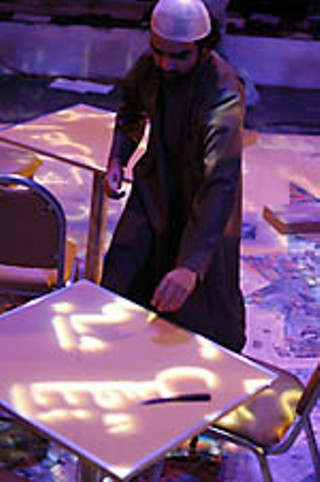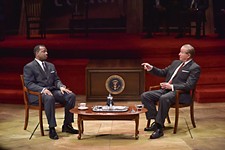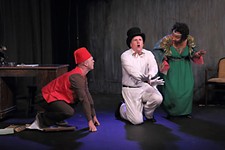Kneeling Down at Noon
The Mary Moody Northen Theatre's Kneeling Down at Noon is a thoughtful and deeply humane drama that considers the way Islam informs the lives and actions of various characters
Reviewed by Robert Faires, Fri., Nov. 17, 2006

Kneeling Down at Noon
Mary Moody Northen Theatre, through Nov. 19
Running time: 2 hrs, 10 min
What if something you hold dear, something as precious to you as life, could be taken from you at any moment? A loved one, your life's work, your good name – at any hour of the day this person or thing could be ripped from your world and held captive, abused, obliterated. How would you live?
For many of the characters in Kneeling Down at Noon, the thoughtful and deeply humane play being given its premiere at St. Edward's University, this isn't a hypothetical. It is their daily existence. They wake, eat, and go about their business with the threat of such loss ever pressing on their hearts, like a dagger's point that might be thrust in at any time. Most of them reside in Syria, where a repressive regime monitors their every move and eliminates anything it deems a danger to its authority. At a street cafe in Damascus, we watch the secret police confiscate the manuscript of an anti-government novel and intimidate its elderly author and also the owner of a nearby newsstand, his wife, and the liberal journalist with whom she's working on an exposé of Syria's treatment of the Kurds. Even though playwright Steve Moore shows us little in the way of explicit violence, the potential for it hangs heavily in the air, notably in the behavior of chief government goon Omar, played with sly menace by Duncan Coe. The rest of the actors communicate an apprehension that seems a part of every breath they take.
But while we're witness to the fear that rules the lives of these characters, we're also witness to their efforts to move beyond it. These are moral people, striving to do good, and as they feel their sense of right and wrong increasingly smothered in Syria's oppressive atmosphere, they come to realize that they can't, as one character says, live the fear. Each must make a painful choice, one that requires the character to sacrifice one thing that he or she holds dear to save someone or something equally precious. Much of what is stirring in the production rises from these instances of self-surrender, deeply considered and filtered through the characters' connection to their faith.
That faith, as suggested by the play's title, is Islam, and its principles and practices are, in a sense, the beating heart of this drama. As the events in Damascus play out, a companion storyline, set in our own city, turns on an American non-Muslim's desire to learn more about Islam. A combat vet who lost the use of his legs during a tour in Iraq, he's seeking a vehicle that will help him move beyond his injury and the hate fueled by his war experience to a place where he can work in the world. Alongside his spiritual quest, the Syrian scenes work to demonstrate that faith in action. That may make the play sound like an advertisement for Islam, but Moore, who is not Muslim, is more concerned with the people who believe than the belief itself. Islam is the lens through which he focuses on the humanity of these particular individuals, how it shapes their notions of justice and mercy, where it gives them the courage to persevere in times of trial and, when they're paralyzed by it, to conquer fear.
Moore and director Katie Pearl portray this with the striking theatricality that's distinguished such previous work as The Whimsy and Nightswim. Although this production is by far the most naturalistic of their collaborations, it frequently breaks free of kitchen-sink conventions to make dramatic points. When an imprisoned woman asks her captor for the direction of Mecca and then she kneels in the direction indicated to her, a group of worshippers fills the stage kneeling and praying in the opposite direction. She never knows the cruel joke played on her, but this simple visual conveys it to us in a way that pierces our hearts. Moore has conjured, quite literally, a character beyond the natural (one best and most delightfully met through the play), and he allows his characters to travel through dreams, externalizing their inner conflicts through images that are at once visually startling and poetically resonant. At one point, the elderly author Ibrahim sees the words of his confiscated book written in light on every surface around him. It's a moment of visual splendor, as painted by lighting designer Diana Duecker, that captures the wonder in this childlike man's heart, how he views his art, his faith, the world.
That moment is echoed at the play's end in words, as Ibrahim completes his novel with a tale of a boy's discovery of Islam. It is a fable that speaks of faith and light, of transformation that can change an instrument of destruction into a transmitter of creation. It whispers of a way of seeing the world, a wonderful way. Listen, and you may hear an answer to that question, how would you live?










